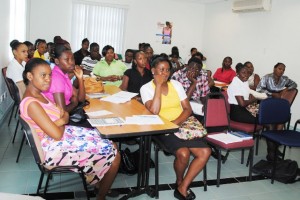BASSETERRE, ST. KITTS (September 4, 2013) — The People Employment Programme (PEP), an initiative of the Federal Government of St. Kitts and Nevis, continues to offer professional training to young persons. It has partnered with the Ministry of Health to train 29 nursing attendants at the JNF General Hospital.

The six-week course which opened on Monday September 2 is the first one that has been sponsored by an entity other than the Ministry of Health, and Minister of Health the Hon Marcella Liburd has commended PEP for not only sponsoring the training but also for paying weekly wages to the course participants.
“Any course you are going into, you have got to pay them. Here you are not paying for the training, do you know how fortunate you be?” posed Minister Liburd. “You are being trained; you are not paying for the training, and you getting paid. Let’s have a little gratitude here.
“I am telling you that all of the other persons, who are nursing attendants, ask them: When they come here for the six-week training, they get a stipend of 100 dollars weekly. You are getting three times the amount that they get to do the same training that they are doing. That is how fortunate you are.”
But on a professional note, Hon Marcella Liburd told the participants that if all they want is a job or just something to do; that they were in the wrong place, because nursing attendant is more than a job and is more than something to do.
“When you have a little quiet moment, consider whether or not you really want to be in this programme,” advised the Minister. “To be in this programme you have to love people; you have to have unconditional love for people. So, if you do not love people forget it.
“In the nursing profession it is ‘watch no face’. You have to look after the sick wherever they come from, whoever they are. You have to love people and that is critical for us here, because we are here to nurse people back to health.”
The People Employment Programme’s Project Manager Mr Geoffrey Hanley said it was a proud moment for the programme, which has funding support from the Sugar Industry Diversification Foundation (SIDF). He equated the training programme with the beginning of a journey that would lead them to a profession, as long as they had the right attitude.
“We boast in St. Kitts and Nevis of having a structured healthcare programme and with the People Employment Programme being able to offer this training through our Ministry of Health we must commend Ms Launette Adams and the matron who when I approached them some weeks ago did not say no,” noted Mr Hanley. “They said, ‘let us see how we get it done’. The PEP is pleased to be offering this training. To date we are servicing 2,661 persons.”
He explained that of the 29 persons in the Nursing Attendant Training programme, eight of them were already enrolled in PEP’s other programmes, but were transferred to this programme because they had earlier indicated that they would be willing to be in the healthcare profession, while the rest are new entrants who had shown interest in the profession.
“The People Employment Programme allows the opportunity for persons to access training in areas that they really desire to be trained,” noted Mr Hanley. “It is very heart warming to see somebody leaving Parks and Beaches where they were cutting grass to now jump into healthcare, wanting to be able to provide healthcare to others, and PEP is giving them that opportunity.”
Of the 29 participants, four are males and it is the first time males are participating in the course. This observation was made by Mr Hanley and also Ms Miranda Langley, Assistant Director of Institutional Nursing Services, who gave brief remarks at the opening ceremony.
“It will give a different perspective because we always hear a lot of women, a lot of things to say that there is a lot of women, but having some males among us, we are hoping that there will be a different perspective and we are hoping that you will work together and that you all will share and you will learn from one another,” said Ms Langley.
JNF Hospital’s Clinical Instructor, who is also the course facilitator, Mrs Sandra Caines, welcomed the trainees and commended them for taking up the mantle to be empowered through education while imploring them to use the opportunity to improve their abilities and capabilities to a personal profession, and most of all nation building.
The participants will spend a total of 110 classroom hours and 100 clinical hours in the six week duration of the course ‘Custodian and Supportive Nursing Care’, explained Mrs Caines.
“This course is designed to prepare persons to perform custodial care and other supportive duties for all nursing attendants within the institution,” said Mrs Caines. “It will prepare participants in understanding principles of infection control, confidentiality, patient communication, interpersonal skills, basic observation techniques, and performance of procedures to assist the other professional staff in maintaining quality nursing care.”
